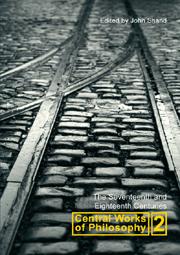Book contents
- Frontmatter
- Contents
- Contributors
- Preface
- Seventeenth- and Eighteenth-Century Philosophy: Introduction
- 1 René Descartes: Meditations on First Philosophy
- 2 Baruch Spinoza: Ethics
- 3 G. W. Leibniz: Monadology
- 4 Thomas Hobbes: Leviathan
- 5 John Locke: An Essay concerning Human Understanding
- 6 George Berkeley: A Treatise Concerning the Principles of Human Knowledge
- 7 David Hume: A Treatise of Human Nature
- 8 Jean-Jacques Rousseau: The Social Contract
- Index
1 - René Descartes: Meditations on First Philosophy
- Frontmatter
- Contents
- Contributors
- Preface
- Seventeenth- and Eighteenth-Century Philosophy: Introduction
- 1 René Descartes: Meditations on First Philosophy
- 2 Baruch Spinoza: Ethics
- 3 G. W. Leibniz: Monadology
- 4 Thomas Hobbes: Leviathan
- 5 John Locke: An Essay concerning Human Understanding
- 6 George Berkeley: A Treatise Concerning the Principles of Human Knowledge
- 7 David Hume: A Treatise of Human Nature
- 8 Jean-Jacques Rousseau: The Social Contract
- Index
Summary
You are an educated person of good common sense who has a healthy dose of curiosity. Imagine yourself as just such a person living in the middle of the seventeenth century, and imagine that you were turning to the most learned people of your day, asking questions about the world around you. Their answers would leave your head spinning. The cutting-edge scientists would be telling you that lemons are not yellow and sugar is not sweet, and that the sun moving across the sky is still but the still earth beneath your feet is moving. The sceptical free-thinkers would be hammering you with a battery of persuasive arguments that always force you to the same conclusion: we can never have rational support for believing either that the world is as it seems, or that it is not as it seems. The scholastic philosophers – the Aristotelians who dominated Europe's universities – would at least be claiming that we have a rational understanding of the world, and that things really are much as they seem to be, but they would be nesting those comfortable claims in a prickly snarl of metaphysical theology about which they endlessly quarrelled among themselves. Faced with these fundamental disagreements, what would it make sense for a person like you to do?
Overview of the Meditations
In 1641, René Descartes published a short work intended to show readers how to find their way out of this bind. Meditations on First Philosophy narrates the sequence of reflections by which anyone might arrive at the correct basic picture of the world.
- Type
- Chapter
- Information
- Central Works of Philosophy , pp. 15 - 36Publisher: Acumen PublishingPrint publication year: 2005

